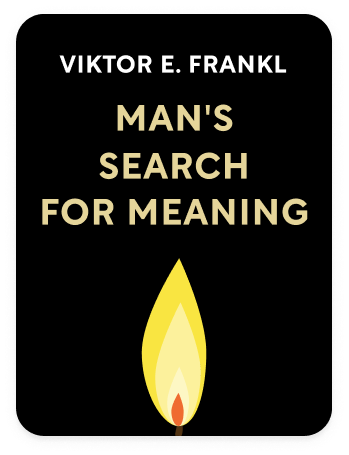

This article is an excerpt from the Shortform book guide to "Man's Search For Meaning" by Viktor E. Frankl. Shortform has the world's best summaries and analyses of books you should be reading.
Like this article? Sign up for a free trial here .
How do we go about finding meaning in life? Can Viktor Frankl’s theory of logotherapy help?
Finding meaning in life is one of the many challenges human beings face. Viktor Frankl argues that by finding a path to meaning, we can survive anything.
Read about logotherapy and the three paths to finding meaning in life.
Finding Meaning in Life: 3 Paths
The last chapter covered the importance of meaning in our lives. But what are some ways we can start to discover our meaning? Logotherapy gives us 3 different paths for finding meaning in life.
- By performing a deed or creating something–taking action.
- By coming into contact with someone or experiencing something.
- By experiencing unavoidable suffering, and the attitude we take toward it.
The First Path – Actions
Actions are the first path to finding meaning in life. We can discover our life’s purpose through the deeds we perform or the things we create, depending on whether we find them to be meaningful.
(Shortform note: Frankl doesn’t spend much time talking about this path, so we’ll fill in the gaps. The rest of this section comes from our research into logotherapy.)
This path focuses on external situations and external realities. We can do things in the world or create things in the world that help us discover and reinforce our meaning.
For instance, usually the people who are happiest in their jobs are the ones who have connected their actions to a meaning that’s important to them, and they usually perform better in their jobs as well.
Let’s use teaching as an example. The best teachers are often the ones who truly believe that their deeds help shape future generations, and who work to fulfill that purpose. Teachers who find no meaning in educating young people are often not the best teachers, because they lack the drive to do it well, as it serves no purpose.
There are a lot of external rewards bound up in this category that can provide immediate gratification as well as deeper meaning. If you routinely win teaching awards at your school, it’s clear that other people consider your actions meaningful.
But it’s easy to get wrapped up in this external gratification, which you should avoid. You can’t make your purpose to win teaching awards, or what you seek becomes public opinion, not your own purpose. That’ll set you up for failure in terms of meaning–since every person has to decide their own meaning, we can’t let others and their praise decide what’s meaningful to us.
This idea applies to more abstract, less practical jobs or positions as well. For example, the most renowned artists–a less practical job than teaching, perhaps–are the ones who created things that worked towards a purpose, whatever theirs might have been. This is one way to learn how to find meaning in life.
- Some people might view Andy Warhol’s pop art as exercises in meaningless recreation–but Warhol was deeply interested in the idea of commercial success, and it’s obvious from his work he was driven to fulfill his purpose of questioning art and artistry in relation to everyday objects or activities, or celebrities.
The Second Path – Love
The second path to finding meaning in life is love. You can derive just as much meaning from an experience as you can from an achievement. This is comforting because it places as much weight on our inner world of personal experience as it does on the outer world of achievement, which is sometimes out of your control.
Positive experiences can help us discover the meaning of our lives, whether it’s through the experiences of beauty, truth, goodness, nature, or culture, or even experiencing other humans in their individuality. These experiences rely on a feeling of love. Romance and sex are forms of love, but love in this context is broader than romantic love–it’s the experience of togetherness, either with a romantic partner, friends and family, or even with nature and culture.
- Through love, we can see another person’s essential qualities and traits–but more than that, through love we can also see their potential–things they might be capable of that they just haven’t actualized yet.
- Love also lets us help our loved ones realize their potential, because we see what they’re capable of and can share it with them, increasing their options and then supporting them as they work to make those potentialities into realities.
- When we find true togetherness with a romantic partner, we feel like our lives are aligned: we feel seen and accepted, challenged and supported, taken care of and driven to take care of our partner.
The people we love can give us great meaning in our lives–it’s why so many parents work hard to give their kids a better life, why spouses are willing to sacrifice things to keep their partners happy as a way to understand how to find meaning in life.
But we can feel this togetherness with nature, too: on a beautiful hike, we feel connected to the world, we see it and appreciate it, we feel grateful for it and driven to take care of it. Loving things beyond people–the natural world, an art form, a subset of animals–can also help us decide the meaning of our life, because we feel that “ultimate togetherness” with another thing, and feel a responsibility to protect, improve, or contribute to that thing.
The Third Path – Suffering
Suffering is the third path to finding meaning in life. As much as we can discover our life’s meaning through positive things, we can also find meaning in the negative, specifically through suffering.
Much suffering is unavoidable in human life–we’re going to lose loved ones, experience losses, and one day die ourselves–but if we view it as a challenge to overcome, something to do with dignity and bravery, then life can have meaning up until our last moments.
Suffering can be an achievement in the way we handle it (and remember, achievements are another path to discovering your meaning). For some, finding meaning in suffering can give them purpose.
This is an especially important concept for Americans, who often feel pressure to be happy and avoid unhappiness and suffering. This pressure makes us ashamed of unhappiness and suffering, instead of supporting logotherapy’s view that suffering can be noble, something to be proud of–if it has meaning. Also, sometimes fixating on being happy makes it harder for us to achieve it.
Note we’re not saying that all suffering is unavoidable, and that you should suffer on purpose. Suffering is NOT necessary to find meaning in your life. If the suffering can be avoided, we should remove the cause of our suffering–otherwise it becomes masochistic.
It’s crucial that suffering should be unavoidable if we’re going to find meaning in it. Specifically, if the suffering is unavoidable, the situation seems hopeless, and our fate can’t be changed–this is when life challenges us to change ourselves.
If we can find meaning in suffering, then that means life has meaning unconditionally. No matter what situation you’re in, your life has meaning.
- A lot of concentration camp prisoners worried that if they didn’t survive the camps, then all their suffering would be meaningless–as if to continue living is the ultimate meaning.
- In contrast, Frankl hoped that their suffering had meaning regardless of something as “happenstance” as survival. Logically, if suffering has no meaning unless you survive, then that ultimately means that life has no meaning, since eventually we all die.
There are 3 main forms of suffering–pain, guilt, and death–and there are 3 corresponding ways of finding meaning in suffering:
- Change personal suffering into personal triumphs. Once we find meaning in our suffering, it almost ceases to be suffering. This is closer to the idea of sacrifice.
- An elderly man came to Frankl with severe depression. His wife had died two years earlier, and she had been his purpose, the person through whom he found meaning in his life. Frankl asked, “What would have happened…if you had died first, and your wife would have had to survive with you?” The elderly man replied that it would have been terrible, she would have suffered just as much as he suffered now. So Frankl pointed out that the man’s suffering did indeed have a purpose–it saved his beloved from suffering herself. This changed the way the elderly man viewed his suffering, and he was able to move beyond his depression.
- Use guilt about past actions to help us improve future actions.
- Logotherapy can help reform prisoners. Often, convicts blame other things for their crimes–society, other conditions, or even the victims of the crime. But logotherapy asserts that criminals had the freedom to commit a crime, and that they also then have the freedom to learn from the guilt, rise above it, and change for the better. In a small sample, logotherapy was able to reduce recidivism significantly.
- Let life’s transitoriness–the fact that we’ll die–inspire us to take action responsibly.
- Our lives are irreversible, but making a decision delivers it safely to the past, where it is permanently stored. Our pasts become fields of harvest for our actions. The goal is to reach the end of your life and look back fondly on the fruits of your decisions: your deeds, the people you loved, and even the sufferings you’ve courageously endured.
Sometimes, we can experience suffering so great that it seems like there can’t be any purpose or meaning in it. Many concentration camp prisoners felt this way. But what if there were purposes beyond our ability to comprehend? This is the idea of a super-meaning: that there might be a purpose to our lives that we are totally unaware of and can never be aware of.
And perhaps we can find some comfort in the idea that it actually might be beyond our intellectual capacity to understand the purpose or the finding meaning in suffering.
- Animals are often used in medical testing to help study diseases and find cures. Objectively, they suffer through repeated injections, physical discomfort, and sometimes death–but their suffering can have great meaning for us as humans. Would those animals be able to comprehend the meaning in their suffering?
- Likewise, is it not possible that our suffering could have meaning that we can’t even conceive of, even if it has meaning on a higher level we can’t comprehend?
Discovering how to find meaning in life is a step on your path of logotherapy.

———End of Preview———
Like what you just read? Read the rest of the world's best book summary and analysis of Viktor E. Frankl's "Man's Search For Meaning" at Shortform .
Here's what you'll find in our full Man's Search For Meaning summary :
- How Viktor Frankl survived four Nazi death camps
- Frankl's life-changing advice for coping with suffering
- Why focusing on what you enjoy isn't enough to make your life meaningful







Thanks Carrie, just what I was looking for.